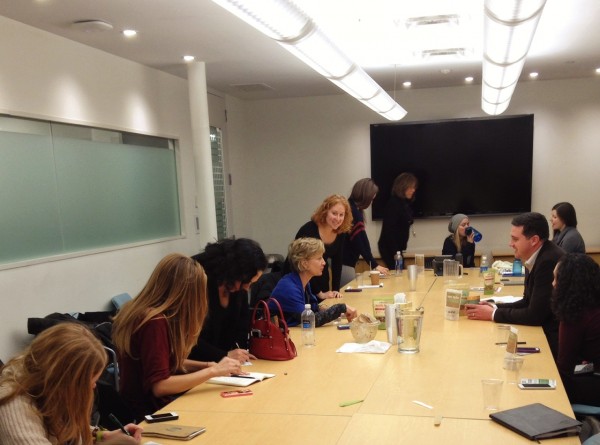A Food Sol Recipe Replicated
For two years, Food Sol has been in recipe development for our Community Table, a design that weekly brings together food entrepreneurs and students of food to exchange resources and ideas.
It became popular at Babson pretty quickly, which led to a question: How would it do in other contexts and communities where the entrepreneurial spirit is not as pervasive as in the action-packed zip code of 02457?
This question led us to experiment with our first Table off campus in the spring of 2013. A simple flyer and a few tweets drew 50 students from MIT, Harvard, Tufts, Northeastern, Clark, Boston University, Bunker Hill Community College and Babson to the community room of a Whole Foods Market in Cambridge. Representatives from the city, the state and Whole Foods corporate also attended.
This first Table test led to Food Sol securing a generous grant from the Blackstone Ranch Institute to seek answers to a next question: How do we intentionally “plant” Community Table in other food-focused communities where local leaders can grow it on their own, fueled by their own entrepreneurial desire and means?
As the spring semester draws to a close, we are proud to report that there are now regular Community Tables in New York City, Providence and Boston/Cambridge. We’ve hosted 110 of them in total, offering chairs and channels to more than 1,500 individuals.
What are the ingredients for replicating (not scaling) the Community Table social innovation?
You need a bowl.
Your bowl is your hub, your committed physical space into which you mix your ingredients (people). Our test bowl for New York was The School of Visual Arts but the value wasn’t there for them long-term, so we found a new bowl in New York University’s Food Studies Program. (An attendee from one of the first Tables loved the model and championed bringing it to NYU for a test there where it stuck, and we received institutional commitment from the department to host one per month throughout the academic year.)
You need a spoon (and your spoon should be local).
Consistent location and timing is important, but your spoon is paramount! Without your spoon you can’t blend anything to exquisite perfection. Our spoon in New York is and always has been Patricia Duffy, the entrepreneur behind Foodmaker Media. She saw the value in the model, wanted it embedded in New York, and was willing to lead the charge. Patricia facilitates Community Table with incredible skill. Her role is one that Food Sol could never successfully play given that our home and headquarters are here. Patricia is the connector in New York for New York based food entrepreneurs and so she is the one to understand what her community, in her geography, needs.
Keep stirring.
As we’ve learned in New York, and taught to Providence, the secret to a successful Community Table is consistency. The bowl in Providence is the Social Enterprise Greenhouse and the spoon is its leadership team. They recognize the importance of rhythm through selection of a regular day of the week and time for the Table. Food Sol and the other spoons publish a semester of dates upfront to make it easy for entrepreneurs to save the dates and share with colleagues. Mailing lists and subsequent attendance grow organically as the spoons continue to show up, stir and stir.
You’re not the only one who can cook.
Early on, we knew that for New York Community Table to work, it couldn’t always be ours. And it isn’t any longer. Patricia and New York University have attracted an incredible array of talent to each and every Table. Food Sol periodically attends simply to soak up learning for ourselves. We refer our own local relationships into the Table because we know how good it is and how much they will get. Our oldest and most stable of the new recipes, New York Community Table is outstanding. But we no longer cook it. Others do and they are brilliant.
This Thursday, Community Table Boston meets at Tavern Road with Front Burner Social, a start-up teaching social media savvy to local eateries. Please join us. If you eat food, you are welcome.

